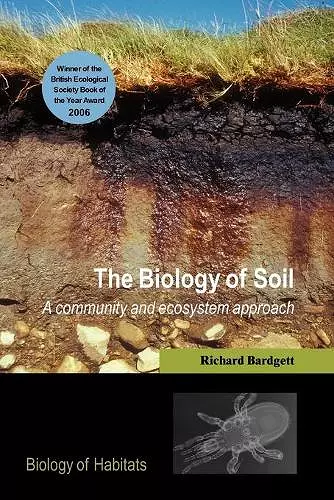The Biology of Soil
A community and ecosystem approach
Format:Paperback
Publisher:Oxford University Press
Published:2nd Jun '05
Currently unavailable, and unfortunately no date known when it will be back
This paperback is available in another edition too:
- Hardback£150.00(9780198525028)

Winner of The Marsh Ecology Book of the Year Award 2006
Considers above-ground/below-ground feedback, herbivores, and the functional significance and regulation of soil biodiversity. This text is suitable for undergraduate and graduate students taking courses in soil ecology and ecosystem science, as well as professional researchers in the fields of ecology and environmental biology.This book is unique in providing a comprehensive, up-to-date synthesis of what is known about soil biodiversity and the factors that regulate its distribution, as well as the functional significance of below-ground biodiversity for ecosystem form and function. It describes the vast diversity of biota that live in the soil environment - the most complex habitat on Earth - and discusses the factors that act as determinants of this diversity across different spatial and temporal scales. The Biology of Soil also considers how biotic interactions in soil influence the important soil processes of decomposition and nutrient cycling . It demonstrates how interactions and feedbacks between diverse plant and soil communities act as important drivers of ecosystem form and function. The importance of these relationships for understanding how ecosystems respond to global change phenomena, including climate change, is discussed in depth. Much is still to be learned about the soil biota and their roles in ecosystems, and the author highlights some of the many challenges that face ecologists in the exploration of soil. Richard Bardgett has wide experience in soil and terrestrial ecology, and his background of research in many ecosystems is reflected in this book which is the most comprehensive, up-to-date volume currently available in soil ecology. It provides an introduction to the biology of soil, and it also discusses the most recent developments in this progressive field of ecology. The importance of soil biotic interactions for community and ecosystem ecology is illustrated through the use of numerous examples and case studies. The Biology of Soil provides an excellent, easy to read introduction for anyone working in the field of soil ecology and related disciplines, and will be ideal for students taking undergraduate and postgraduate courses in soil ecology, plant-soil relationships, ecosystem ecology, and land management.
I recommend this book to soil ecologists across a range of expertise and to soil and environmental scientists who want to increase their understanding of the role of soil biota in ecosystem processes. * European Journal of Science, 58, 1213-1220 *
Our understanding of how soils function is rapidly growing and this small, easily read book will bring everyone up to date, backed up by an impressive bibliography...as an introductory text it is excellent. Peter Thomas, Bulletin of the British Ecological Society 2006, 37:2
... this book has immense potential as a core key teaching resource for instructing ecology students about the importance of soils and aboveground-belowground feedbacks. In addition to recommending this as a teaching text, I strongly recommend The Biology of Soil to any ecologist who does not actively work in soils and wants to learn more about their fascinating ecology. * Trends in Ecology and Evolution and Evolution *
- Winner of Winner of The Marsh Ecology Book of the Year Award 2006.
ISBN: 9780198525035
Dimensions: 233mm x 156mm x 15mm
Weight: 383g
256 pages